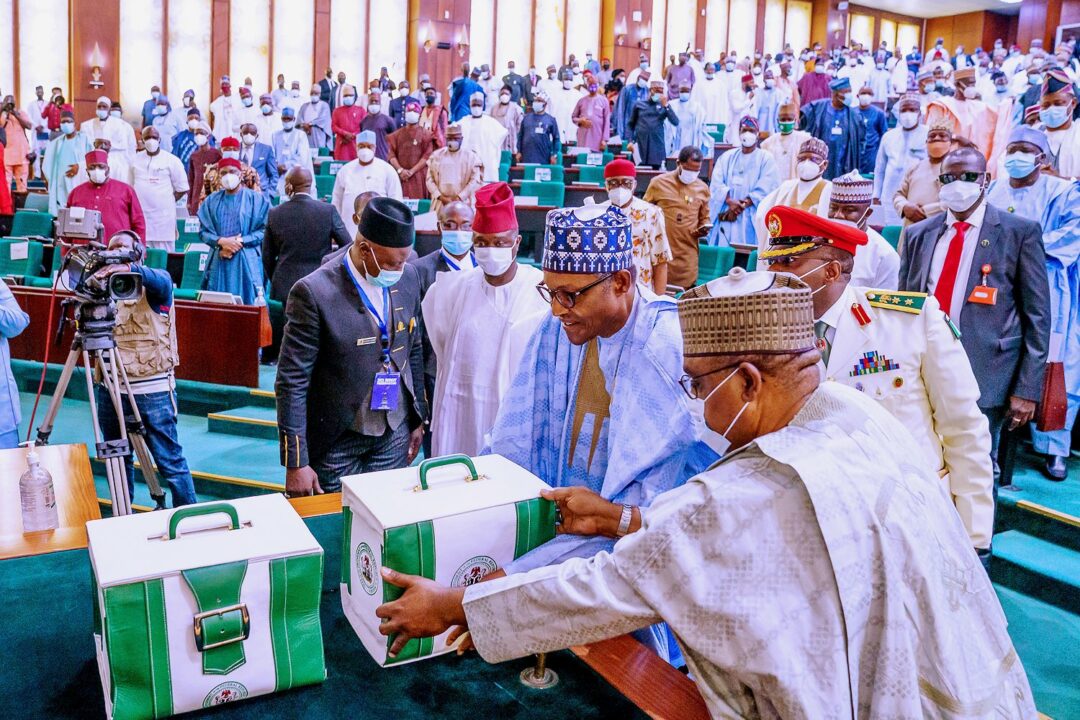The breakdown of the 2021 Budget has emerged.
Newsone Nigeria reports that a N13.08 trillion 2021 Appropriation Bill was presented by President Muhammadu Buhari before a joint session of the National Assembly for consideration and approval on Thursday, October 8.
The President said during the budget presentation that the 2021 Appropriation has been themed the “Budget of Economic Recovery and Resilience” in “view of the many challenges confronting us, we must accelerate our economic recovery process, promote social inclusion and strengthen the resilience of the economy.”
President Buhari said the 2021 budget is expected to “accelerate the pace of our economic recovery, promote economic diversification, enhance competitiveness and ensure social inclusion.”
The President said: “The 2021 – 2023 Medium Term Expenditure Framework and Fiscal Strategy Paper set out the parameters for the 2021 Budget, which include:
a. Benchmark oil price of 40 US Dollars per barrel;
b. Daily oil production estimate of 1.86 million barrels (inclusive of Condensates of 300,000 to 400,000 barrels per day);
c. Exchange rate of N379 per US Dollar; and
d. GDP growth projected at 3.0 percent and inflation closing at 11.95 percent.”
Federal Government Revenue Estimates
“Based on the foregoing fiscal assumptions and parameters, total federally distributable revenue is estimated at N8.433 trillion in 2021. Total revenue available to fund the 2021 Federal Budget is estimated at N7.886 trillion. This includes Grants and Aid of N354.85 billion as well as the revenues of 60 Government-Owned Enterprises,” President Buhari said in his speech, adding that “Oil revenue is projected at N2.01 trillion. Non-oil revenue is estimated at N1.49 trillion. As you will observe, the format of the 2021 Appropriation Bill has been modified to include budgeted revenues, no matter how small, for each MDA, to focus on internal revenue generation. Accordingly, I implore you to pay as much attention to the revenue side as you do to the expenditure side.”
Below is the breakdown of the 2021 budget
Planned 2021 Expenditure
An aggregate expenditure of N13.08 trillion is proposed for the Federal Government in 2021. This includes N1.35 trillion spending by Government-Owned Enterprises and Grants and Aid funded expenditures of N354.85 billion. For 2021, the proposed N13.08 trillion expenditure comprises:
a. Non-debt Recurrent Costs of N5.65 trillion;
b. Personnel Costs of N3.76 trillion;
c. Pensions, Gratuities and Retirees’ Benefits of N501.19 billion;
d. Overheads of N625.50 billion;
e. Debt Service of N3.124 trillion;
f. Statutory Transfers of N484.49 billion; and
g. Sinking Fund of N220 billion (to retire certain maturing bonds).
Fiscal Balance
The 2021 Budget deficit (inclusive of Government Owned Enterprises and project-tied loans), is projected at N5.20 trillion. This represents 3.64 percent of estimated GDP, slightly above the 3 percent threshold set by the Fiscal Responsibility Act, 2007. It is, however, to be noted that we still face the existential challenge of Coronavirus Pandemic and its aftermath; I believe that this provides a justification to exceed the threshold as provided for by this law.
The deficit will be financed mainly by new borrowings totalling N4.28 trillion, N205.15 billion from Privatization Proceeds and N709.69 billion in drawdowns on multilateral and bilateral loans secured for specific projects and programmes.
Statutory Transfers
The sum of N484.49 billion provided for Statutory Transfers in the 2021 Budget represents an increase of N56.46 billion (or 13 percent) over the revised 2020 provision. The Statutory Transfer provisions are:
a. Niger Delta Development Commission – N63.51 billion;
b. North East Development Commission – N29.70 billion;
c. National Judicial Council – N110.00 billion;
d. Universal Basic Education Commission – N70.05 billion;
e. Independent National Electoral Commission – N40.00 billion;
f. National Assembly – N128.00 billion;
g. Public Complaints Commission – N5.20 billion;
h. Human Rights Commission – N3.00 billion; and
i. Basic Health Care Provision Fund – N35.03 billion.
“In compliance with the Fiscal Responsibility Act 2007, all beneficiaries of Statutory Transfers will be required to provide the Budget Office of the Federation with periodic reports on the allocation and expenditure of funds for inclusion in the quarterly Budget Implementation Report,” the President said in his speech.
Recurrent Expenditure
In our efforts to enhance national security and human capital development, a major part of the 2021 recurrent cost estimate is allocated to paying salaries and overheads in MDAs providing these critical public services. These include:
a. N227.02 billion for the Ministry of Interior;
b. N441.39 billion for the Ministry of Police Affairs;
c. N545.10 billion for Ministry of Education;
d. N840.56 billion for Ministry of Defence; and
e. N380.21 billion for Ministry of Health.
Personnel Costs
“Personnel cost is still our largest single item of expenditure. In the 7 months to 31st July 2020, it accounted for 34 percent of total Federal Government spending and is projected at 33 percent of 2021 expenditure.
To check the incidence of payments to non-existent personnel and unauthorised allowances, only Federal staff that have been captured on the Integrated Personnel Payroll Information System (‘IPPIS’) platform will receive salaries.
“All agencies have been directed to ensure that they obtain all necessary approvals before embarking on any fresh recruitment. Any breach of these directives will be severely sanctioned.”
Debt Service
We remain committed to meeting our debt service obligations. Hence, we have provisioned N3.12 trillion for this in 2021, representing an increase of N445.57 billion from N2.68 trillion in 2020. A total of N2.183 trillion has been set aside to service domestic debts while N940.89 billion has been provided for foreign debt service. N220 billion is provided for transfers to the Sinking Fund to pay off maturing bonds issued to local contractors and creditors.
Overhead Costs
“Total overhead costs of MDAs and Government Owned Enterprises are projected to rise to N625.50 billion in 2021, mainly due to the inclusion of the overheads of an additional 50 Government Owned Enterprises. Overhead provisions have also been made for newly created agencies. To keep a tab on running costs, MDAs must adhere to extant expenditure controls.”
Capital Expenditure
An aggregate sum of N3.85 trillion is expected to be available for capital projects in 2021, as summarised below:
a. N1.80 trillion for MDAs’ capital expenditure;
b. N745 billion for Capital Supplementation;
c. N355 billion for Grants and Aid-funded projects;
d. N20 billion for the Family Homes Fund;
e. N25 billion for the Nigeria Youth Investment fund;
f. N336 billion for 60 Government Owned Enterprises;
g. N247 billion for capital component of Statutory Transfers; and
h. N710 billion for projects funded by Multi-lateral and Bi-lateral loans.
“The 2021 capital budget is N1.15 trillion higher than the 2020 provision of N2.69 trillion. At 29 percent of aggregate expenditure, the provision moves closer to this Administration’s policy target of 30 percent.
“Capital expenditure in 2021 remains focused on the completion of as many ongoing projects as possible, rather than the commencement of new ones. We have also made efforts to ensure equity in the distribution of projects and programmes in the proposed budget. I will be providing the National Assembly a list of some of the most critical projects which we must work collectively to ensure they receive adequate funding. Until projects reach completion, they do not deliver the dividends of democracy that Nigerians rightly deserve.”
Highlights of the 2021 Capital Projects
Key capital spending allocations in the 2021 Budget include:
a. Power: N198 billion (inclusive of N150 billion for the Power Sector Recovery Plan);
b. Works and Housing: N404 billion;
c. Transportation: N256 billion;
d. Defence: N121 billion;
e. Agriculture and Rural Development: N110 billion;
f. Water Resources: N153 billion;
g. Industry, Trade and Investment: N51 billion;
h. Education: N127 billion;
i. Universal Basic Education Commission: N70 billion;
j. Health: N132 billion;
k. Zonal Intervention Projects: N100 billion; and
l. Niger Delta Development Commission: N64 billion.






